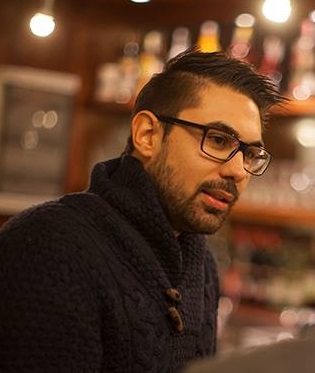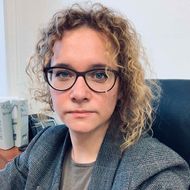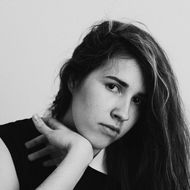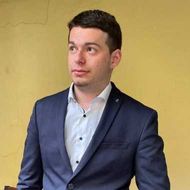- A
- A
- A
- ABC
- ABC
- ABC
- А
- А
- А
- А
- А
- HSE University
- Faculties
- Faculty of Social Sciences
- School of Psychology
- News
- 'I am excited to be on the ground floor of this long-term project'
-
Education
-
The School
- About
-
Laboratories
-
- The Scientific-Educational Laboratory of Ability Psychology
- Center for Sociocultural Research
- International Laboratory of Positive Psychology of Personality and Motivation
- Laboratory for Cognitive Research
- Cognitive Psychophysiology Laboratory
- Vision Modelling Laboratory
- Laboratory for the Neurobiological Foundations of Cognitive Development
-
- Partners
- Staff Members
- International Cooperation
Phone: +7 (495) 772-95-90 *15366
Email: dekpsy@hse.ru
Address: 101000, Moscow, Armyanskiy per. 4, c2
Address for correspondence: 20 Myasnitskaya Ulitsa Moscow 101000 (School of Psychology)
In press
Popyvanova A., Pomelova E., Bredikhin D. et al.
IEEE, 2024.
Шевченко Н. А.
Psychology. Journal of the Higher School of Economics. 2025. Vol. 22. No. 1. P. 49-59.
W. Joseph MacInnes, Zhozhikashvili N., Feurra M.
In bk.: First International Conference, AIiH 2024, Swansea, UK, September 4–6, 2024, Proceedings, Part II. Artificial Intelligence in Healthcare. LNCS, volume 14976. Vol. 14976. Springer, 2024. P. 221-234.
Ivanova M., Germanova K., Petelin D. et al.
Biorxiv. 005140. Cold Spring Harbor Laboratory, 2024
The School promotes cutting-edge research, multidisciplinary studies, education in English. We are increasing the number of courses in English all the time and have started two English-speaking Master’s Programs. Our researchers have access to Eye trackers, TMS, multi-channel EEG, MEG and fMRI techniques.
The School also aims to train psychologists, who can apply their knowledge in the fields of economics, banking, human resources management, organizational development, ecopsychology and team-building.

'I am excited to be on the ground floor of this long-term project'
 WHAT IS YOUR BACKGROUND?
WHAT IS YOUR BACKGROUND?
I am a graduate student at University of Padua (Italy), at which I had both my bachelor's degree in "psychological science and psychobiology" and my Master's degree in "Experimental Psychology and Cognitive Science". Over my master education I had the chance to spend one year as Erasmus student at the Institute of Cognitive Neuroscience - Ruhr University Bochum (Germany), in which I developed my master's thesis work by investigating, together with my supervisor Prof. Christian Bellebaum, the neural mechanisms underpinning learning of action-outcome contingencies in active and observational learning. After this enlightening experience abroad, I discussed my thesis project in Padua and I graduated in spring 2013.
WHAT PROMPTED YOU TO ENTER THIS FIELD OF NEUROSCIENCE?
During my studies I developed a keen interest in several topics within cognitive psychology especially decision making. What prompted me to enter in this field of neuroscience is the simple consideration that we live in a fast growing and uncertain world and the study of decision making and neuroeconomics raise the question of how human beings (and animals) make choice among possible alternatives in both certain and uncertain conditions. In particular, neuroeconomics is a merging approach in the social sciences that integrates theories, methodologies, and ideas from neuroscience, economics, and psychology to study how individuals make economic decisions. I carried out my first research in neuroeconomics investigating the psychophysiological indexes of risk taking behavior in both non- pathological and pathological gamblers while performing economical decision making. This first research, taken when I was a sophomore, shown me a glimpse of what the world of decision making research is, leaving me with the desire of following a path in this realm and to keep on investigating this exciting field of research.
WHY DID YOU CHOOSE RUSSIA AND CENTRE FOR COGNITION AND DECISION MAKING?
The Centre for Cognition & Decision Making is a very new, international and interdisciplinary research group, leaded by Prof. Vasily Klucharev, whom build a modern European research and educational center, with the ambitious goal to become one of the first centers of research both in Russia and internationally. I choose to pursue my Ph.D. in neuroeconomics at HSE in of the big chance to be supervised by Prof. Klucharev and work together in his team and I am excited to be on the ground floor of this long-term project. On the other hand I am really sure I will take advantage of my colleagues' expertise and their international experience. I strongly believe that Higher School of Economics and the Centre for Cognition and Decision Making represents a stimulating environment in which I will have the opportunity to improve my skills, gain deep knowledge in this exciting branch of neuroscience and to become a strong and valuable researcher. I also love the idea to develop my Ph.D. project in such an international and interdisciplinary research team, in which I can have the possibility to compare and discuss my researches ideas from several points of view.
WHAT ARE YOUR FIRST IMPRESSIONS ABOUT FACULTY OF PSYCHOLOGY HSE AND CENTRE FOR COGNITION AND DECISION MAKING?
I met professor Vasily Klucharev and his team the day after my arrival in Moscow and I had the opportunity to have a tour of laboratories and facilities of the faculty of Psychology. I was fascinated by the research that they are currently conducting and impressed by the facilities available at the Centre for Cognition & Decision Making, with the possibility to apply a number of paradigm and techniques, even combining them in the same study. The labs have state-of-art technology and approaches that the modern neuroscientific research request in order to improve the efficacy of modern and cutting-edge studies. Moreover, I found motivated and friendly people, an aspect that I believe is important for a working environment.
ARE YOU SATISFIED WITH THE SUPPORT SYSTEMS THAT ARE AVAILABLE?
I am absolutely amazed by the support I have been receiving by several member of the HSE's staff over my first period in the city. It is only due to their efforts that my first impression of Russian bureaucratic system has been rather painless, making my first two weeks in Moscow very enjoyable and comforting. They planned everything before my arrival in the city, taking responsibility of several aspects of bureaucratic processes from the activation of my bank to my accommodation. So I would like to publicly thank Dr. V. Moiseeva, Dr. A. Shestakova, A. Plotnikova, E. Krugliakova and M. Beresniskiy for their outstanding support and to make me feel a little bit - and in a positive way - pampered.
DO YOU HAVE ANY TROUBLE WITH THE LANGUAGE?
Russian language is very different from my native language and of course I am experiencing some problems in daily non-structured situations, in which I have problems to foresee potential questions from others. Luckily I had the opportunity to learn to read Cyrillic and it emerged to be a crucial skill. Indeed I have been able to move by metro without experiencing any kind of problem or feel bewildered as well as to learn new words everyday or to buy food. At work I am not asked to know Russian at all, as I am daily surrounded by English speaker people. On the other hand, I am very willing to learn some basics and I aim to be able to get by in daily situations as soon as possible, even thank to my Russian colleagues, who are giving me daily - and very fun - lessons and testing my knowledge on a daily basis.
HOW DO YOU LIKE BEING IN MOSCOW? HAVE YOU EVER BEEN TO OTHER RUSSIAN CITIES?
I am from a very small town placed in the heart of Franciacorta, northern Italy, with a population of 5000 people, and despite of the fact I travelled a lot across Europe, it is my first time in such a huge city. Living here is an overwhelming experience and for me is a dream come true. I have always felt a big attraction toward Russia, its history and its culture. I have also appreciated Russian literature and art, a keen passion that I developed after reading Crime and Punishment at the age of 17. I did wish for years to have the opportunity to visit the Country and finally I realized this dream in 2011, where I had the chance to spend the new year's eve in St. Petersburg. It was an amazing experience, that reinforced my will to explore this incredible country. Moscow is rather different from St. Petersburg, but just as fascinating and full of opportunities. I want to explore all its hidden corners, on the streets as well as the famous places.
WHAT ARE YOUR SHORT TERM AND LONG TERM CAREER GOALS? WHAT ARE YOUR GENERAL PLANS FOR THE FUTURE?
While I am in the doctoral program my short-term goals are to continue to strengthen my technical knowledge in the field of neuroeconomics and cognitive neuroscience, and to engage in research to extend the theoretical understanding of human decision making and behavior. After completing the PhD program, my long-term objective is to seek a teaching and research position in a research or academic institution where I can share my experience and knowledge with others excited about neuroeconomics and where I can research, identify, and provide new challenges, perspectives, and approaches to this field of neuroscience.
Marco Colosio
- About
- About
- Key Figures & Facts
- Sustainability at HSE University
- Faculties & Departments
- International Partnerships
- Faculty & Staff
- HSE Buildings
- Public Enquiries
- Studies
- Admissions
- Programme Catalogue
- Undergraduate
- Graduate
- Exchange Programmes
- Summer Schools
- Semester in Moscow
- Business Internship
-
https://elearning.hse.ru/en/mooc/
Massive Open Online Courses
-
https://www.hse.ru/en/visual/
HSE Site for the Visually Impaired
-
http://5top100.com/
Russian Academic Excellence Project 5-100
- © HSE University 1993–2025 Contacts Copyright Privacy Policy Site Map
- Edit


